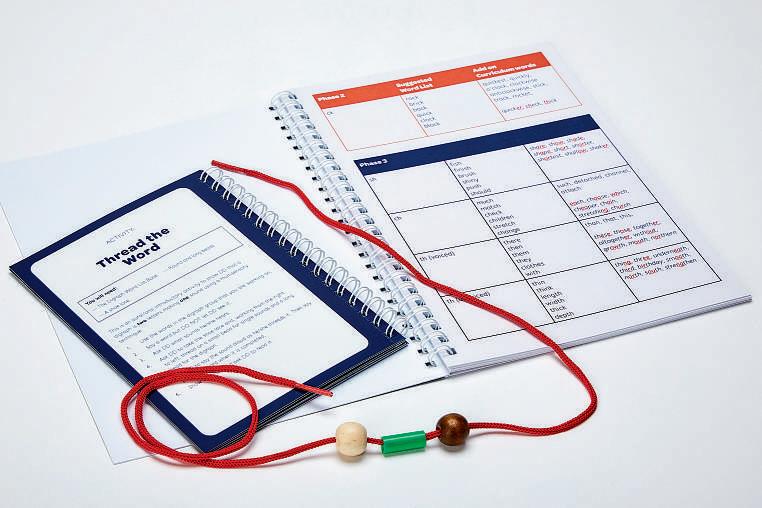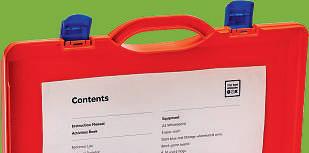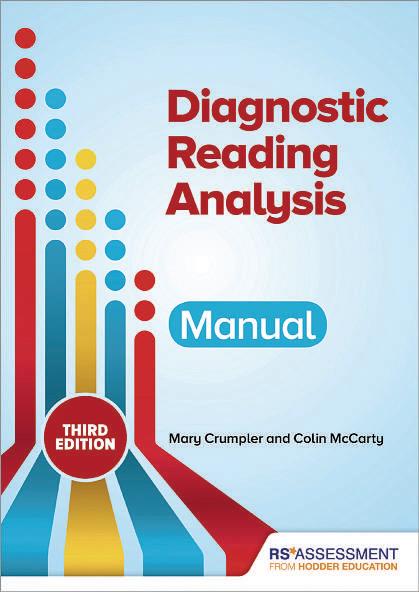
19 minute read
Medicine optimisation in schools
40 / FEATURE ➜ SPOTLIGHT
M e d i c i n e O p t i m i s a t i o n i n S c h o o l s
Is pharmacy part of the solution to a collaborative health and education service delivery model for children and young people in special schools? Nirusha Govender discusses.
T
he number of dispensed prescriptions for children and young people (CYP) has increased in recent years, with more children that need to take medicines during school time. This can be for a range of medical conditions including asthma, epilepsy, diabetes, attention deficit hyperactivity disorder (ADHD), and other more complex health conditions.
The percentage of pupils with an Education, Health and Care (EHC) plan attending state funded special schools has seen a year on year increase since January 2010 from 38.2 per cent to 59.9 per cent in January 2021. Approximately 2 per cent of school-age children attend a special school, and the vast majority have an EHC plan.
On 1 September 2014, a new duty came into force for governing bodies. Section 100 of the Children and Families Act 2014 places a duty on governing bodies of maintained schools, academies and pupil referral units (PRUs) to have in place arrangements that support pupils with medical conditions at their school. Appropriate authorities must have regard for statutory guidance when carrying out their statutory duty to make suitable arrangements to support pupils at school with medical conditions.

WHY IS THIS AN ISSUE FOR SPECIAL SCHOOLS?

BIO
N I R U S H A G O V E N D E R
Pharmacist Nirusha Govender is currently the associate director for Medicines Governance and Pharmacy Education at NHS Kent and Medway Integrated Care Board (ICB). Over the past 12 years, she has worked closely with specialist children’s nursing, local authorities and special schools. Nirusha’s work with a number of special schools in Kent focuses on medicines optimisation service provision including: training, competency assessments, quality improvement and assurance reviews and a medicines information service. Within the collaborative commissioning structure between the NHS and Local Authorities for special schools, there has never been a formal pathway to promote or support the need for a pharmacy-led medicines optimisation service in schools. The SEND reforms introduced by the Children and Families Act 2014 focus on two key themes: greater co-operation between education, health and social care and a greater focus on outcomes. The Act, along with the comprehensive guidance in the SEND Code of Practice, outlines detailed requirements for the planning and delivery of services for CYP. They also require local authorities to implement joint commissioning arrangements with their health partners for the education, health and social care of CYP.
With no standardised approach to how this is achieved, great variations exist nationally on how this model is being delivered. There are vast differences even in localised areas, where some schools have full collaborative working between LAs and health partners (primarily specialist community nursing services) and other schools having little or no support at all with the need to fund their own health provisions.

WHAT ARE THE CHALLENGES IN SPECIAL SCHOOLS?
CYP attending special schools can have recognised physical and/or mental health conditions, with many having complex health and care needs. This includes administration of medicines (sometimes off-label or unlicensed) with complex dosing regimens for some specific conditions. It may include managing acute episodes, and medicines administered via specialist devices such as intrathecal pumps, enteral feeding tubes, infusion pumps and syringe drivers. It is not a requirement for a special school to employ a school nurse, which means that in many special schools, teachers and teaching assistants play a significant role in medicines administration, storage and other healthcare related matters. In most cases these individuals lack medical or pharmaceutical experience. Parents can worry when sending their child to school if medicines are needed during the school day and there can also be anxiety for staff if they do not feel confident in administering them.
The growing evidence highlights an important need to get the fundamentals of medicines use right in schools. A
42 / FEATURE ➜ SPOTLIGHT



cross-sectional survey of schools undertaken in 2017 by Bellis et al identified that there were vast differences between how individual schools managed medicines and interpreted policy guidance and also discrepancies between the views of CYP, parents, schools and healthcare professionals. The study highlighted evidence that medicines management provisions do not always meet the needs of CYP and their families, with fewer than half of parents and healthcare professionals being satisfied with how medicines are dealt with in schools. This is even more challenging for special schools, with a strong emerging evidence base highlighting the complexity of medical conditions and the nature of medicine regimens administered in schools. McCarthy et al recommended that consultation with a pharmacist may provide valuable advice on storage and accurate dispensing of medication.
A pilot study in 2018 by Kent Community Health Foundation Trust (KCHFT) showed that, with the appropriate level of specialist pharmacy support, the schools were largely successful at supporting the safe and effective management of medicines to CYP, minimising the risk of errors. The pilot demonstrated an overall improvement of 65 per cent compliance with Royal Pharmaceutical Society medicines administration records standards, seeing a 90 per cent compliance rate for most data entries evaluated. KCHFT made appropriate clinical interventions including deprescribing recommendations to the special school. This helped the school to achieve a 60 per cent reduction of required salbutamol inhalers at school, improving patient outcomes and minimising the medicines waste burden on the wider health economy.
The quality improvements within this pilot provided the evidence base for a unique commissioning model for ten special schools in Kent, which now have the support of a health team with both nursing and pharmacy support. In 2021, the team was awarded Health Education England transformation funding, which showcased the transformation of the pharmacy technician role within this niche setting. Full details of the project, including successes, outputs and future plans have been published on the Royal College of Paediatrics and Child Health QI Central hub (https://bit.ly/3ViZI8h).

SO WHAT IS THE SOLUTION?
Reducing health inequalities and improving health and wellbeing are major priorities for pharmacy. Pharmacists’ and pharmacy technicians’ skills of listening, explaining, advising and questioning are all highly relevant to help identify and support the medicines optimisation needs of CYP with complex health needs in special schools.
Medicines optimisation is about helping people to get the best outcomes from their medicines. Although a specialist pharmacy service for special schools requires a review of the commissioning processes and funding mechanisms to standardise and fully meet the needs in these schools, community pharmacists can still play a pivotal role. Their work in supporting CYP, families, teachers and healthcare professionals working in special schools will help to promote a more localised approach to medicines optimisation at home and in schools.
Community pharmacists are local, accessible and ideally placed to develop close links with CYP, families and their schools and provide crucial assistance, including:
To support safe and effective management of medicines to CYP in school, minimising the risk of errors, through medication reviews and the provision of Medicines Administration
Record (MAR) charts if appropriate.
To effectively manage the supply of medicines for CYPs’ long term medical conditions, improving monthly repeat prescription management and minimising waste.
To help provide access to medicines information and answer questions related to individual children’s medicine needs from parents/carers.
With this in mind, it is important for special schools to work collaboratively with parents and local pharmacies/commissioned pharmacy teams to ensure medicines optimisation principles can be safely implemented at school.
In the future, there is a growing need for the Department for Education, alongside the Department for Health and Social Care, to ensure that there is a structured commissioning pathway within the SEND and mainstream health provision to enable all CYP and families to have equitable access to specialist services including medicines optimisation.
Ask theteam
There is always a steady stream of questions arriving at nasen House and, of course, the Education Team answers them as soon as possible. But, while many of them are specific to a particular context, the answers to a number of them could be helpful to the wider nasen membership. ‘Ask the team’, provides the space to share these questions and answers.
If you have a question, and think the answer would be useful to everyone, please submit it to education@nasen.org.uk Of course, you can always give nasen House a call too.
SEND REVIEW ON WAY
As there have been so many changes of ministers at the DfE since September last year, do you happen to know when the SEND review response will be published?
SENCO, Birmingham



Thank you for raising this. They say a week is a long time in politics but a lot has happened since the consultation finished back in July! The new director of the SEND and AP directorate at the DfE, Alison Ismail, confirmed that they remain committed to publishing the response by the end of the calendar year. ce the t f th SEND d AP di t t

PUPPET POWER
I have a very quiet autistic girl in my class who struggles with speaking to anyone except me and the teaching assistant. However, we observed her in the playground talking animatedly to her gloves, almost using them like puppets. Would there be any issues, in your experience, that would cause a negative impact from her using a puppet within the classroom?
Teacher, Whitehaven
ATTENTION SPAN
Since the pandemic we have seen an increased number of children struggling to maintain concentration and attention in lessons across all year groups. Staff have expressed frustration and we want to use our INSET day to do some planning and develop a bank of strategies to support staff with this. Are you aware of any strategies that could help those students with SEN specifically?
Deputy p y headteacher, Lincoln,
What we know is that if it is good for students with SEN it will be good for everybody. What is vital for some is valuable for all. Getting it right for students with SEN will automatically support more than students with SEN. At nasen we advocate inclusion by design and providing a solution for one and extending to many will support pupils, diagnosed and undiagnosed, to access the learning. One example of how to do this can be found in CAST’s Universal Design for Learning principles (UDL). The three main guidelines are around developing multiple means of engagement, representation and action and expression. If pupils have their needs considered at the start of the planning process, they will be more likely to engage and give the activity the attention that they seemingly lack. The guidelines are split into 27 areas for support with interactive links to support. There is a great planning tool that will help staff to consider changes to their teaching to support those pupils to engage. https://bit.ly/3Lwg4pM – CAST guidelines https://bit.ly/3DyuGD0 – planner An article on this very topic featured in the July edition of Connect. The piece features a story of a young autistic boy who effectively communicated with everyone through a puppet. It helped him to separate the voice from himself and gave him confidence to speak. You didn’t state which year group the child is in, but the only negative could be the possible impact from other pupils’ comments and reaction. This must be considered very carefully as belonging is such a crucial part of successful attendance and academic engagement. Perhaps there could be a session in which all pupils design a puppet and use this to communicate, which will introduce this as an option for your class. It may also help other children, whose needs might not be as obvious, to develop their confidence. Modelling this yourself would also be a good starting point. To read the article on this topic, check the July edition on our website. https://bit.ly/3LrZBTf nasen Connect, July edition g y Str ikingthe rightnot e How music can play akey role in literacy support programmesfor children with special needs

Also available online ISSN 2631-5696 HELPINGELPIH EVERYONER ACHIEVE JULY 2 022 / I SSUE 34 www.nasen.org.uk
Reviews
A BO U T O U R S C H O O L S T

his is a truly magnificent piece of writing from two of the greats in education over the last 30 years. Brighouse and Waters have extensive experience of how the education system works (and doesn’t). Through interviews with a variety of key figures in education past, present and hopefully future, they have sensitively, and with clarity, addressed the many issues surrounding how we got to this point.
I confess to being disheartened at the weight of the book, but once I opened it, I only put it down to give my wrists a well-deserved rest. The book starts from the 1976 reforms and presents the history of education in England, taking you through to how we arrived at the current system with its plethora of exams, accountability, and over-centralisation.
Early in the book, one of the values they extol is that achievements should be recognised in ways that are helpful to the pupil and their future, “with this being separate from the accountability arrangements for our schools”. This change alone could see inclusion skyrocket in the secondary sector. Self-regulation is discussed as being a vital aspect of growing up and how adolescence impacts this.
Our school system needs to be able to support this but anyone looking at the exclusion figures and the dramatic increase around puberty will recognise the current limitations. With insight from best practice examples from the past and present,

Authors: Tim Brighouse and Mick Waters Publisher: Crown House Publishing ISBN: 978-178583586-5 Reviewed by: Zoe Mather, education officer at nasen
insightful comments from a variety of education professionals and their own common-sense approach, I guarantee this book will have you demanding their “six foundation stones and 39 steps to success” become policy.


Author: Chris Dyson Publisher: Crown House Publishing ISBN: 978-1785836008 Price: £14.99 Reviewed by: Shona Randle, recently retired headteacher of an inclusive primary school
PARKLANDS – A SCHOOL BUILT ON LOVE
Chris Dyson was compelled to write this book when his school was inundated with visitors wanting to find out more about the school and its journey to outstanding. Chris invites you to share his journey of school improvement and this reader happily took up that invitation.
The foreword has a great story demonstrating the focus on the deep care the adults have for the children which makes the Parklands magic. Each chapter carefully unpicks all the complex elements that make a school and explains the Parklands way to do it by carefully summarising the Parklands fundamentals for each element. SEND is not a huge section nor discussed in any detail. Rightly so, as Parklands has inclusion in action, with each child valued and supported to achieve in their own way. The passion and love that Chris has in abundance comes shining through to the reader. Chris succinctly describes the time when the school and a new headteacher are aligned and then the intangible magic begins to happen. This could be a handbook for new school leaders, with lists of resources, contacts and strategies interwoven throughout the narrative.
Chris guides us on how to successfully handle local/national media and social media platforms. He also explains his ways for engaging companies to improve funding streams and how that funding is used for the benefit of the children. Not all school leaders are made in the same mould as Chris, but they will enjoy reading and celebrating the dedication of the staff at Parklands in improving children’s outcomes.

WHAT THE SCHOOL PARTICULARLY LIKED:
The ‘short and sweet’ aspect; Ten Minute Box can fit easily into busy schedules and the pupils enjoyed that the activities aren’t too long so it seems easier to get through. Being given word lists and sentences for writing meant that I didn’t have to make them up myself; this was a great time saver. Easy, concise record keeping system.
To find out more, www.fiveminutebox.co.uk/ product/ten-minute-box/
PRODUCT: THE TEN MINUTE BOX
Advertised age range:
Y2 (6 years old) through to secondarndary y
Skills/curriculum areas:
literacy – reading and writing (phonics)honics) Trialled by: Karen Earl, SENCO and specialist teacher Setting: Micklefield School, aReigate



Overview:
Ten Minute Box, a multisensory phonics intervention, is a new product which helps pupils to: learn and retain 50 digraphs read and write the digraph families in isolation, words and sentences improve self-confidence by familiarising pupils with words containing digraphs across the curriculum improve pupils’ independence in learning through them being responsible for the use of the contents of the box improve attention with short, targeted lessons that follow a routine consolidate learning and transfer to long term memory through frequent repetition. It also enables educators to track areas of need that may point to unidentified Specific Learning Difficulties.
All of the resources needed to teach are in an appealing portable case. The lesson plans are clear and concise and designed for any member of staff to implement. The simple Instruction Manual makes it easy for staff to get started using the Ten Minute Box. Additional training is available but is not essential. The Ten Minute Box also includes pre and post assessments as well as easy to use tracking sheets, which enables monitoring of progress.
The children that used the box enjoyed doing so, particularly as the activities were time limited and the routine meant that they always knew what was coming next and so were prepared. I used Ten Minute Box with two pupils. After four weeks, one of them knew 50 per cent of the digraphs that were unknown before using the resource, and the other pupil knew 70 per cent. In addition to this, both pupils began to see patterns between words and were able to think more creatively regarding how to remember certain spelling patterns.
Moving forward I will continue to use Ten Minute Box because as well as being effective, the short amount of time required means that it is an efficient intervention to use with a number of children.
tw k u o to



EventsDiary
British Dyslexia Association Practical Solutions Plus – Reading Wednesday 23 November 2022, 09:30 - 15:30 Online and e-learning While aimed specifically at those working with and supporting dyslexic individuals with learning to read, the content of this programme will assist anyone who is involved in teaching reading to improve their skills and knowledge. To book: https://bit.ly/3PGpLmN Cost: £120

nasen webinars For the full programme and for details of the Webinar Pass, please visit https://bit.ly/3zImMSA
University of East London Unmute now!: How to make sure we hear the voices of people who receive care and support. Thursday 2 February, 11.00-12.30 Online We explore digital approaches that can be used to amplify the voice of people who receive care and support. Communication experts will share strategies and technologies that can be integrated into your existing processes, offering new ways to capture the thoughts, feelings and aspirations of people we support. To register: https://bit.ly/3RRfzrH Cost: Free
Nursery World Show 2023 3-4 February 2023 Business Design Centre, London To register: https://bit.ly/3yy61uM Registration free. CPD sessions can be booked and paid for online.
National SEND Conference 2023
21 June 2023 Central London Hear about the latest requirements and expectations in light of COVID-19 and the SEND Review Assess how to successfully meet the standards of the SEND Code of Practice and the SEND Inspection Framework Gain insights on the role of SENCOs and SEND leaders in supporting the delivery of outstanding SEND teaching and support To register interest: https:// bit.ly/3RUlbS7
Early Years Seminar: ‘Assess, Plan, Do, Review, It’s the only way through!’
Thursday 9 February 2023, 9.30 - 12.30 Online This DfE funded seminar is FREE to attend and is aimed at Early Years and SEND practitioners, SENCOs and managers and Local Authority Teams from across England. The conference includes a keynote from Annamarie Hassall, nasen’s CEO, and three local authority presentations. Cost: Free To book: https://bit.ly/3Tbu2At
BETT Show 2023 29-30 March 2023 ExCeL, London On-time registration for Bett ends on 3 March 2023 and is FREE. Late registration (4 March 2023 onwards) tickets will incur a £25 fee. To get a free ticket, simply register on or before 3 March. To register: https://bit.ly/3ExOh6D

















